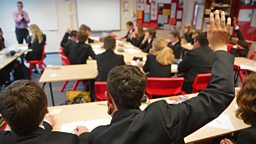Top of the Class
In What Should We Teach Our Kids, Robert Peston investigates the future of education. Leadership and problem-solving emerge as two of the most desirable skills, but what else can our schools learn from education systems globally?

Japan
Working for a common goal is hugely encouraged in Japan and it is not uncommon for teachers and students to clean the school together every afternoon, which fosters a sense of communal responsibility by the environment.
Finland
Although it has been knocked off the top spot by South Korea, Finland has consistently topped the education ratings in recent years. Finnish children rarely take exams or do homework. Science classes only contain 16 students to enable everyone to perform practical experiments. 43% go to vocational secondary schools and, interestingly, Finland spends around 30% less per student than the US does.
China
The children of Shanghai's cleaners and caterers are three years more advanced than UK lawyers' and doctors' children in maths. The Chinese education system is based around rote memorisation, which makes Chinese students great at taking tests but not necessarily capable when it comes to problem solving.
Spain
Spanish schools place a strong emphasis on mentoring, with older students mentoring the younger to foster cohesion across the school and encourage empathy.
Bhutan
Great emphasis is placed on public speaking and the practise of mindfulness (including mindful chocolate eating – students have to keep the chocolate in their mouths and focus on it for fifteen minutes), from silent reflection in assembly to an opportunity to ‘letting the mind settle’ when entering a new class.
India
India sets incredibly high store on the study of Maths and rather than students being given the academic structure of equations, they are given problems to work through – they rarely read about maths from a textbook.
Denmark
Schools in Denmark try to boost confidence by avoiding a didactic approach and equipping students to discover what they need to know for themselves. One particularly progressive school in Copenhagen has abandoned classrooms altogether and teaches in a variety of hubs, focused around a kitchen. Being educated in a more communal environment also teaches the students to consider what impact their behaviour will have on others.
South Korea
Children in South Korea often attend school seven days a week, and their English is better than students in France. Songs, dance and games are used at primary level to teach, and even kindergarten students are given lavish ‘graduation’ ceremonies, in response to the huge reverence with which education is held and its status as ‘the gateway to the middle class’.
-
![]()
How to turn a school around
With Herminder Channa, Principal at ARK Boulton Academy.
-
![]()
The idea changing the world’s best education system
Saila Linkopuu, Principal at Etu-Töölö Upper Secondary School, explains 'phenomenon learning'.
-
![]()
The Educators
Sarah Montague interviews the people whose ideas are challenging the future of education.
-
![]()
My Teacher is an App
Sarah Montague presents a series looking at how technology has changed education.




